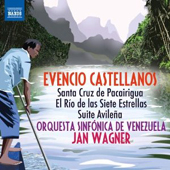
ESSENTIAL RECORDINGS

Evencio Castellanos (1915-1984) belonged to the generation of Venezuelan composers
who established a new nationalistic style in the first half of the 20th century. One of his best known
works, Santa Cruz de Pacairigua (1954) pays homage to the construction of a
church in Guatire, near Caracas, quoting popular dance rhythms and melodies, as well as a Venezuelan
medieval carol. El Rio de las Siete Estrellas (The River of the Seven Stars) (1946),
inspired by a poem about the Orinoco River, describes events of pre-colonial Venezuelan history
leading up to the country's independence in 1821. The Suite Avilena (1947), a
compilation of scenes alluding to the coastal mountain of El Avila, borrows from popular songs and
Christmas carols, and features the cuatro (a four-stringed version of the European classical guitar)
and maracas, two of the most typical Venezuelan folk instruments. {Naxos}
Combine the South American style of Ginastera, the percussion enriched orchestration of Respighi, and
the atmospheric flavor of Debussy (La Mer), and you start to get an idea of what the music of Venezuelan
composer Evencio Castellanos sounds like. The slower, more lyrical segments of
his works in particular, demonstrate a talented composer with a strong individual voice. Although the
Santa Cruz de Pacairigua is considered one of his signature works, it is not, in my
opinion, the best example on this CD of this composer's work. Despite the fact that it ends with all
pistolas blazing, it is simply too folk-influenced to really display his creative skills.
On the other hand, the El Rio de las Siete Estrellas (The River of the Seven Stars),
inspired by a poem to the Orinoco river, paints a much broader panoramic musical landscape than most
South American composers have ever set to paper, and although rather episodic in nature, still forms
a descriptive and evocative tone picture from start to finish, which ends in quite an orchestral flourish.
The Suite Avilena, depicting five short scenes of everyday life, also brings out the
best of Castellanos. For example, his use of the cuatro within the orchestral fabric is at
once subtle and yet very effective. The use of it at the end of the middle movement Nocturno
is ear-catching and memorable. The Suite ends with Navidad (Christmas) in which the
seamless blend of Christmas carols and traditional folk elements again clearly demonstrate this
composer's innate writing abilities. Adeste Fideles just simply becomes part of the thematic material
that drives the music forward, without focusing too much attention on itself.
Another fine addition, including what seems to be some world premieres, to the
Naxos Latin American Classics series of recordings, presenting the music of a composer
who played a major role in establishing the strong foundation leading to today's strong youth
orchestras of Venezuela.
Jean-Yves Duperron - February 2012